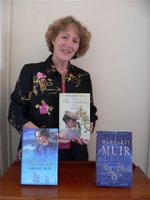Marketing for Authors blog has moved
Marketing for Authors blog has a new home at Word Press. Please update your links and bookmarks: http://marketingforauthors.wordpress.com/ I'll be moving over archives in due course.
A blog about marketing, for authors.
Marketing for Authors blog has a new home at Word Press. Please update your links and bookmarks: http://marketingforauthors.wordpress.com/ I'll be moving over archives in due course.
Practical up-to-date advice for book marketers. Got a tip to share? Email me. Media: Do you Squidoo? Margaret Muir does. And Susan Higginbotham. Information from Seth Godin about what Squidoo can do for authors here. Some useful opinion from dearauthor.com on what every author’s website should contain. “The web is one of the best medium to market/ promote to a niche audience,” according to In My Books blog, who knows what she’s talking about – she does online marketing for a living. She says, “the modern day author without an online presence… risks alienating themselves from new and younger readers.” Inspiration: In the vicinity of Santa Rosa, CA, U.S.? Literary attorney Robert G. Pimm is speaking on various aspects of publishing including book marketing on Sunday, 12th November. Not in the vicinity of Santa Rosa? You can still read the summary of the talk on book marketing I gave at this year’s RNA Conference here.
The ebook market in 2005 was worth $11 million U.S. dollars* and if growth trends continue should break $15 million in 2006. A multi-million dollar industry then, but still small fry. A small UK publisher with 11 staff and producing 100 titles a year has approximately this turnover.** The ebook market in 2005 published 5,000+ new titles. It doesn’t take a genius to work out that there’s less in the total pot per title. My ebook has brought in a few pennies. Kate Johnson, aka Cat Marsters, tells me her etitles earn significantly better. So what’s in it for the epublished author? Riches, if you promote? Or is the cost of promotion too high for the possible returns? * Source: International Digital Publishing Forum ** John Blake Publishing
Promotion is a lonely and often unrewarded road, says Margaret Muir, in today's Sunday interview. But you can get results if you set your sights at an attainable level.
 Margaret Muir grew up in Yorkshire but now lives in Western Australia Her second novel, The Twisting Vine, was published in August.
Margaret Muir grew up in Yorkshire but now lives in Western Australia Her second novel, The Twisting Vine, was published in August.
1. What kinds of marketing have you done as an author? Mainly Internet marketing via website, blog and Squidoo, plus networking on Yahoo groups. Through a press release package, I have announced my publications to the writing organisations in Western Australia, local papers and specific magazines. I have also given a number of talks.
2. What marketing did your publisher do? Hale circulated their brochure to UK libraries and their distributor in Australia. They notified the major online stores – Amazon, Smith and Borders, sent out review copies as requested and supplied bookmarks and flyers for promotional purposes. Finally, they participated in a book competition by supplying free copies.
3. What essential things about marketing did you learn that you wish you'd known from the start? A book’s life is short – only 2 to 4 months. Marketing a UK-published book when you live in Australia isn’t easy. Postage costs are high and the British media are not particularly interested in overseas authors. Even at home, marketing is expensive – postage, printing etc. It’s a lonely and often unrewarded road.
4. What did you learn during your experiences of trying to market your books? I learned that you are a very small fish in a very large ocean. Rather than focusing on the major media outlets it's better to set your sights at an attainable level. I also discovered the need for a unique selling point.
5. What's the most successful piece of marketing you've done?
Firstly, achieving feature articles in two glossy doll magazines - due out shortly. Secondly, seeing a major travel article I wrote published in the national Australian broadsheet with a link to my first book, Sea Dust.
6. What advice would give for authors starting out with marketing their books?
Find an angle for marketing your book. When you discover the unique selling point, promote accordingly. Make use of the full range of media outlets and make best use of the internet – websites, blogs etc, and networking groups. I firmly believe, time spent on marketing is more effective than money.
Does what it says on the tin is an expression used in the UK when we describe a product that functions exactly as the labelling promised. It originated as an advertising slogan for Ronseal, a manufacturer of varnishes. Now, I’ve just had a novella published entitled The Restless Heart. You’re guessing it’s a romance aren’t you? Or possibly an emotionally harrowing biography or autobiography. It’s a romance, but that word Restless also promises a bit of suspense doesn’t it? Good. Because The Restless Heart is a romance with a bit of suspense. The book delivers what it says on the tin. Here are my other book titles to date: The Lady Soldier -> this one’s about a lady soldier and has quite a lot of military adventure Fateful Deception -> another suspenseful romance involving fate and a big deception Perfidy and Perfection -> a rom com with a nod towards Jane Austen The rule is this – choose your book titles wisely, or keep your fingers crossed that your publisher chooses wisely for you. Your title is a primary marketing vehicle for your book.
Marketing for Authors blog will be returning in November 2006. If you're an author who would be like to be featured or have any ideas for this blog email me.
Practical up-to-date advice for book marketers. Got a tip to share? Email me. Amazon: “Author Connect could become an incredible author marketing vehicle,” Mike Nothum speculates about Amazon’s latest new service for authors. I’d say he could be right. This is definitely one to watch. Planning: New year’s marketing resolutions - did you make any? If not, why not? Alison Brennan makes a good point about readers being the ultimate purchase decision makers. What can you do in 2006 to reach new readers, or reach your readers in new ways? Jot down the three things you're going to try out for your author marketing in 2006 and pin it on your wall. Promotion: Could you take a leaf out of Stephan King's book and promote via text message? Textually.org reports that Stephan King’s new novel, Cell, is to be marketed in the US via 100,000 text messages.
An occasional column for when someone asks me an interesting question. How do I get my book published? is probably the single most unanswered question from unpublished book writers. I've received several emails from unpublished writers asking for advice related to marketing your book to editors and agents (rather than marketing your book to book buyers and readers - the real subject of this blog). While I feel that to go into detail here and now would be off-topic, I know how it feels to chasing publication and only getting in return rejection letters. I have notes from a workshop I put together on the subject. Called 'Strategies and Tactics for Slushpile Mountaineers' it deals with how to professionally prepare and submit your fiction manuscript for consideration to publishers and agents. If you would like a copy of these notes, please email me. Tuesday tips will return in the new year.
 John Spencer is co-author (with Anne Spencer) of a number of books concerning the paranormal including The Encyclopedia of Mystical and Sacred Sites, published by Headline in 2002.
John Spencer is co-author (with Anne Spencer) of a number of books concerning the paranormal including The Encyclopedia of Mystical and Sacred Sites, published by Headline in 2002.
1. What kinds of marketing have you done as an author?
I think it's more publicity; I did interviews on TV, radio and in newspapers and magazines. I also did some signings etc. The marketing was done by publishers Hodder Headline.
2. What marketing did Hodder Headline do?
For earlier books they were very good; for example they got me into bookclubs where we were bookclub book of the month three times and sold 300,000 copies in hardback before going into paperback and foreign, but as the subject waned a little they lost interest and for this last book frankly I think they did very little marketing.
3. What essential things about marketing did you learn that you wish you'd known from the start?
I did get involved in the early days with actually attending marketing department meetings and giving talks to the sales force to 'beef them up'. Headline stopped that in the later years. I think it helped sales though when they were selling to chains and clubs to be able to say they had spoken to the author personally.
4. What did you learn during your experiences of trying to market your books?
That you need to seriously suck up to the marketing department head at your publisher!
5. What's the most successful piece of marketing you've done?
The bookclubs were our best publicity. In addition to the one I already mention, another sold around 70,000 copies in hardback and went to several successful overseas translations as the result of bookclub intros.
6. What advice would give for authors starting out with marketing their books?
As far as possible try and make yourself available for interviews and brush up on your TV and radio image techniques.
Most authors who approach me for publicity help, even if they are already published, are still labouring in the misapprehension that it’s all about the book. Yes, the book is important - to a degree - but what is going to sell it from a publicity point-of-view can very likely be enhanced, perhaps significantly, by you the author. If an author is not willing to 'tart themselves around a bit', then my heart sinks as it’s going to make my job of book promotion all the harder. Authors, like well-cellared wine, have a mystique. Make the most of it, like Harold Pinter did in his Nobel prize acceptance speech yesterday. You’ve got a synopsis of your book, and a blurb. You also need an author synopsis (your author bio) and a 50-word short version that show how you are different from the thousands of other authors out there. You need to define the key selling points of you, the author. What is it you bring to your book(s) which is unique? They say that dogs are often reflections of their owners. Your books will be perceived (quite rightly) as a reflection of you. Here’s my unique points, and their sub-texts: a) I’m young and enthusiastic --> aka you’ll see that pace and energy in my stories b) I have a sense of humour --> aka this is a story you’re going to enjoy because I write for entertainment purposes c) I’m obsessed by history --> aka my books might be historical romance but I have an honours degree in History from a prestigious UK university and I take my research seriously Can you list yours?